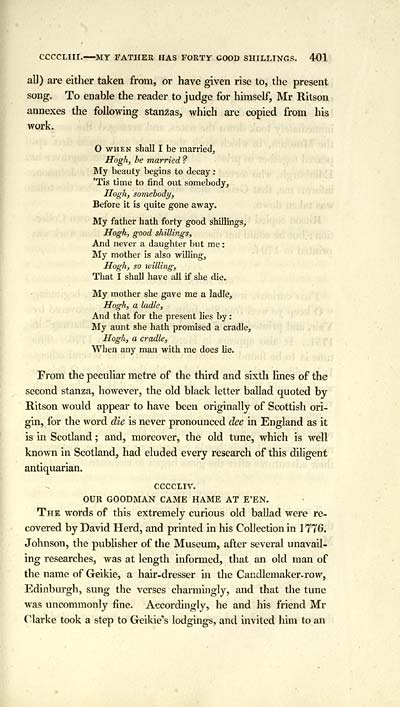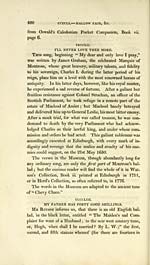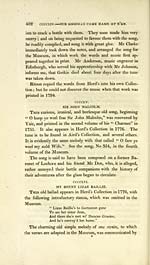Glen Collection of printed music > Printed music > Scots musical museum > Volume 5
(161) Page 401
Download files
Complete book:
Individual page:
Thumbnail gallery: Grid view | List view

CCCCLIII. MY FATHER HAS FORTY GOOD SHILLINGS. 401
all) are either taken from, or have given rise to, the present
song. To enable the reader to judge for himself, Mr Ritson
annexes the following stanzas, which are copied from his
work.
O WHEN shall I be married,
Hogh, be married?
My beauty begins to decay :
*Tis time to find out somebody,
Hogh, somebody,
Before it is quite gone away.
My father hath forty good shillings,
Hogh, good shillings,
And never a daughter but me :
My mother is also willing,
Hogh, so willing.
That I shall have all if she die.
My mother she gave me a ladle,
Hogh, a ladle.
And that for the present lies by :
My aunt she hath promised a cradle,
Hogh, a cradle,
When any man with me doeS lie.
From the peculiar metre of the third and sixth lines of the
second stanza, however, the old black letter ballad quoted by
Ritson would appear to have been originally of Scottish ori-
gin, for the word die is never pronounced dee in England as it
is in Scotland ; and, moreover, the old tune, which is well
known in Scotland, had eluded every research of this diligent
antiquarian.
CCCCLIV.
OUR GOODMAN CAME HAME AT E'EN.
The words of this extremely curious old ballad were re-
covered by David Herd, and printed in his Collection in 1 776.
Johnson, the publisher of the Museum, after several unavail-
ing researches, was at length informed, that an old man of
the name of Geikie, a hair-dresser in the Candlemaker-row,
Edinburgh, sung the verses charmingly, and that the tune
was uncommonly fine. Accordingly, he and his friend Mr
Clarke took a step to Geikie's lodgings, and invited him to an
all) are either taken from, or have given rise to, the present
song. To enable the reader to judge for himself, Mr Ritson
annexes the following stanzas, which are copied from his
work.
O WHEN shall I be married,
Hogh, be married?
My beauty begins to decay :
*Tis time to find out somebody,
Hogh, somebody,
Before it is quite gone away.
My father hath forty good shillings,
Hogh, good shillings,
And never a daughter but me :
My mother is also willing,
Hogh, so willing.
That I shall have all if she die.
My mother she gave me a ladle,
Hogh, a ladle.
And that for the present lies by :
My aunt she hath promised a cradle,
Hogh, a cradle,
When any man with me doeS lie.
From the peculiar metre of the third and sixth lines of the
second stanza, however, the old black letter ballad quoted by
Ritson would appear to have been originally of Scottish ori-
gin, for the word die is never pronounced dee in England as it
is in Scotland ; and, moreover, the old tune, which is well
known in Scotland, had eluded every research of this diligent
antiquarian.
CCCCLIV.
OUR GOODMAN CAME HAME AT E'EN.
The words of this extremely curious old ballad were re-
covered by David Herd, and printed in his Collection in 1 776.
Johnson, the publisher of the Museum, after several unavail-
ing researches, was at length informed, that an old man of
the name of Geikie, a hair-dresser in the Candlemaker-row,
Edinburgh, sung the verses charmingly, and that the tune
was uncommonly fine. Accordingly, he and his friend Mr
Clarke took a step to Geikie's lodgings, and invited him to an
Set display mode to: Large image | Transcription
Images and transcriptions on this page, including medium image downloads, may be used under the Creative Commons Attribution 4.0 International Licence unless otherwise stated. ![]()
| Special collections of printed music > Glen Collection of printed music > Printed music > Scots musical museum > Volume 5 > (161) Page 401 |
|---|
| Permanent URL | https://digital.nls.uk/87804542 |
|---|
| Description | Scottish songs and music of the 18th and early 19th centuries, including music for the Highland bagpipe. These are selected items from the collection of John Glen (1833 to 1904). Also includes a few manuscripts, some treatises, and other books on the subject. |
|---|
| Description | The Glen Collection and the Inglis Collection represent mainly 18th and 19th century Scottish music, including Scottish songs. The collections of Berlioz and Verdi collected by bibliographer Cecil Hopkinson contain contemporary and later editions of the works of the two composers Berlioz and Verdi. |
|---|

